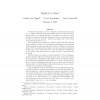Free Online Productivity Tools
i2Speak
i2Symbol
i2OCR
iTex2Img
iWeb2Print
iWeb2Shot
i2Type
iPdf2Split
iPdf2Merge
i2Bopomofo
i2Arabic
i2Style
i2Image
i2PDF
iLatex2Rtf
Sci2ools
96
Voted
SIGECOM
2009
ACM
2009
ACM
Destroy to save
We study the problem of how to allocate m identical items among n > m agents, assuming each agent desires exactly one item and has a private value for consuming the item. We assume the items are jointly owned by the agents, not by one uninformed center, so an auction cannot be used to solve our problem. Instead, the agents who receive items compensate those who do not. This problem has been studied by others recently, and their solutions have modified the classic VCG mechanism. Advantages of this approach include strategy-proofness and allocative efficiency. Further, in an auction setting, VCG guarantees budget balance, because payments are absorbed by the center. In our setting, however, where payments are redistributed to the agents, some money must be burned in order to retain strategyproofness. However, there is no reason to restrict attention to VCG mechanisms. In fact, allocative efficiency (allocating the m items to those that desire them most) is not necessarily an appropr...
| Added | 28 May 2010 |
| Updated | 28 May 2010 |
| Type | Conference |
| Year | 2009 |
| Where | SIGECOM |
| Authors | Geoffroy de Clippel, Victor Naroditskiy, Amy R. Greenwald |
Comments (0)

